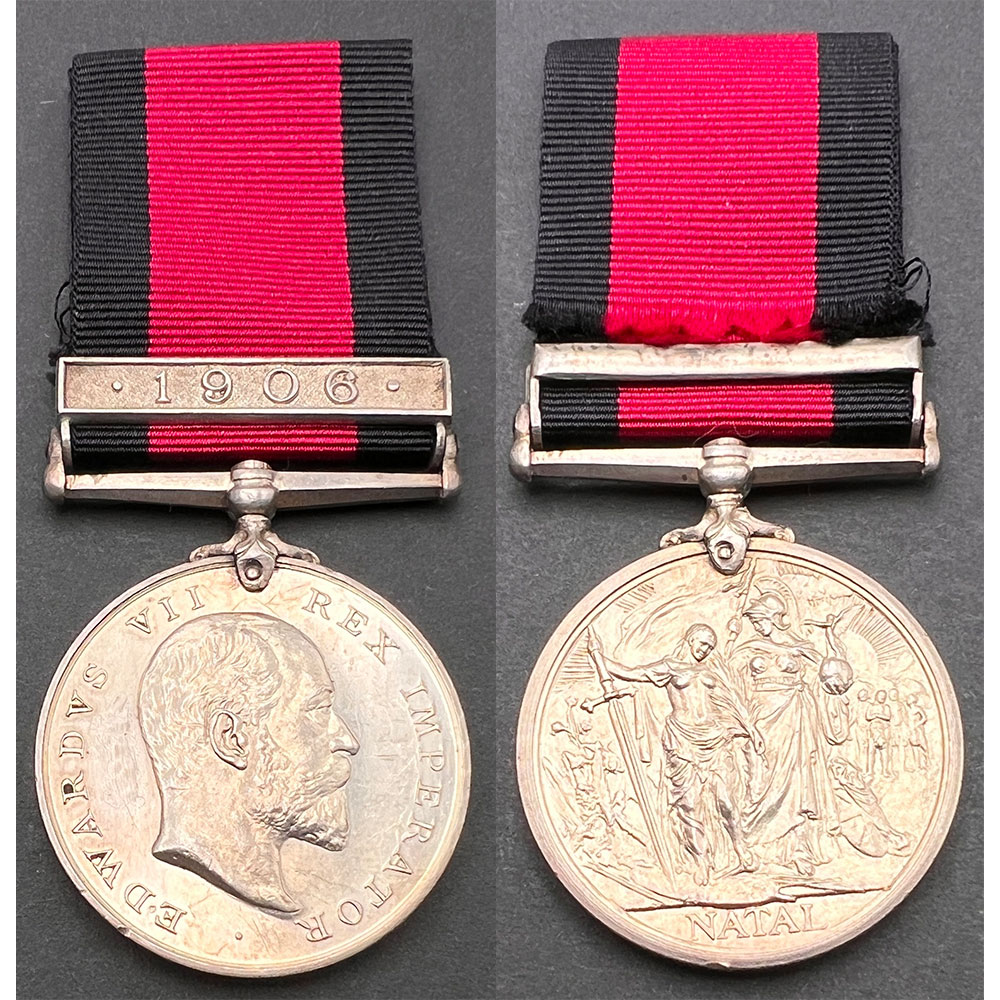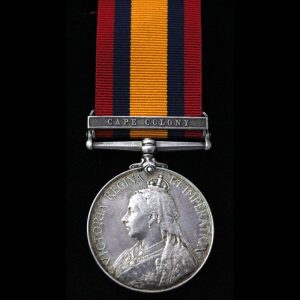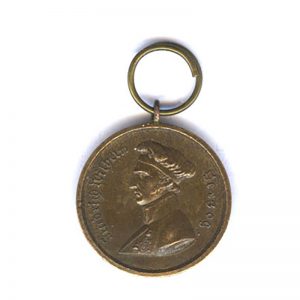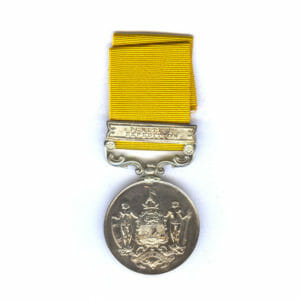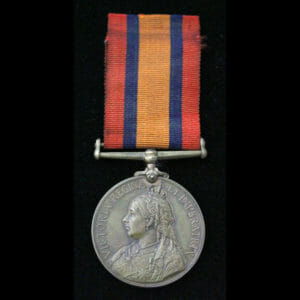Description
Natal Medal, bar 1906, Private W. Leng, Lancs and Yorks Contingent.
Officially impressed: “Pte W. Leng, Lancs. & Yorks. Contg”
Confirmed on the medal roll, one of about 150 recipients of the medal and 1906 clasps for service in the Zulu Rebellion.
Leng is an unusual name mostly encountered around Yorkshire.
A Walter (Brown) Leng, born in Northallerton, Yorkshire during 1866, was in South Africa during the Boer War, where he joined Rimmingtons Guides during 1901 who appears to be him.
He appears to be the only Colonial “W. Leng” to have fought previously in the Boer War, having served with Damants Horse, Rimmington’s Guides and Kimberley Horse.
He came to South Africa with his family, his 60 year old father John George Brown Leng died on 28th January 1899.
It appears the family came to South Africa, after 1872 when his father was part of a “Extraordinary Bankruptcy Case at Stockton” in Durham.
The case was recalled in great detail in numerous newspapers, the Yorkshire family living in Durham at the time, where his mother Ann was from.
His father was put in prison for 6 months, and the family was gone from the 1881 census, suggesting they left in disgrace after the scandal.
William remained in South Africa, where he died aged 84 on 30th April 1947 in Johannesburg.
The members of the Lancashire and Yorkshire Association were described as a group of “Ruffianly Rosebuds”, known locally as “Bailey’s Rosebuds”.
Many of them had previous experience fighting Zulu rebels and had seen plenty of South African “Pacification” wars in their life.
A telegram from Johannesburg, 29th May 1906, in the Pall Mall Gazette;
“The Natal Government has accepted Mr. Bailey’s offer of 150 men for service in Natal. All of them belong to the local Lancashire and Yorkshire Association, and the majority have seen active service.”
Their President was Sir Abraham “Abe” Bailey, 1st Baronet, KCMG a colonial born son of a Yorkshire man, who would later become one of the world’s richest men through control of South African Diamonds thanks to his special ties to Cecil Rhodes.
The Association ended in 1929 the following is an article in the Sheffield Daily Telegraph on 10th August 1929, regarding their services in Natal during 1906;
END OF FAMOUS CLUB – TRANSVAAL CENTRE FOR LANCS AND YORKSHIRE MEN
Owing to the membership falling off and to the competition of other clubs of a political nature, and other attractions, it has been decided to dissolve and liquidate the club of the Transvaal Lancashire and Yorkshire Association, situated just off Von Brand’s Square, in Johannesburg.
Founded in 1894 as the Lancashire and Yorkshire Association, the club was broken up by the South African War, but in 1904 was reformed under the old name, with Mr Abe Bailey (now Sir Bailey) as its first President, and the late Mr Ward Jackson (for many years editor of the Rand Daily Mail) as Chairman, the first named of Yorkshire descent and the latter a Lancashireman.
The Association had its headquarters in the former residence of the late Captain Von Brandis, but it moved to The Gables, Jeppe Street, more commodious premises.
At the outbreak of the Zululand Native Rebellion in 1906, 150 members of the association volunteered for active service, being called “Bailey’s Rosebuds.” The men were mobilised and equipped within 48 hours, the contingent being generally financed by Mr Bailey and was highly complemented by the then Natal Government on their splendid services.
Three of the original members of the club, Sir Abe Bailey, the late Mr John Quinn, and Senator Tucker became members of the first Transvaal Parliament under responsible Government in 1906 and the last name filled the office of Mayor of Johannesburg.”
Some additional information from “Sir Abe Bailey His Life and Achievements” a History Honours research paper by Hamilton Sayer, University of Cape Town 1974, taken from J. Stuart’s a History of the Zulu Rebellion, 1906:
“At the request of the Natal authorities, imperial troops were hastily dispatched from the Transvaal, and Bailey offered to raise, equip and maintain at his own expense a contingent of 150 men (25 being mounted) of the Lancashire and Yorkshire Association.
In effect, Bailey was prepared to defray all expenses relating to equipment, clothing and saddlery, but not salaries and food supplies. The offer was accepted by the Natal Government and enrolment began on 1st June; under the command of Lt Col Thomas Peakman, the corps presented itself for inspection some three days later. On arrival in Natal on 4th June, the corps was directed to attach themselves to MacKay’s column, where they remained until the end of operations in Zululand.”
